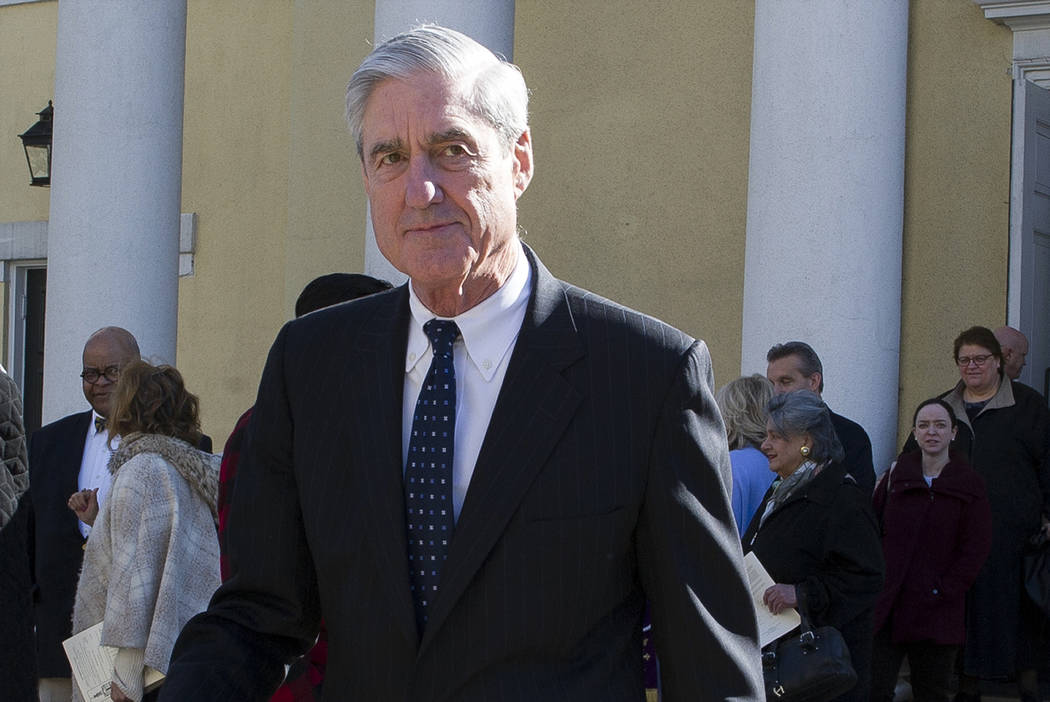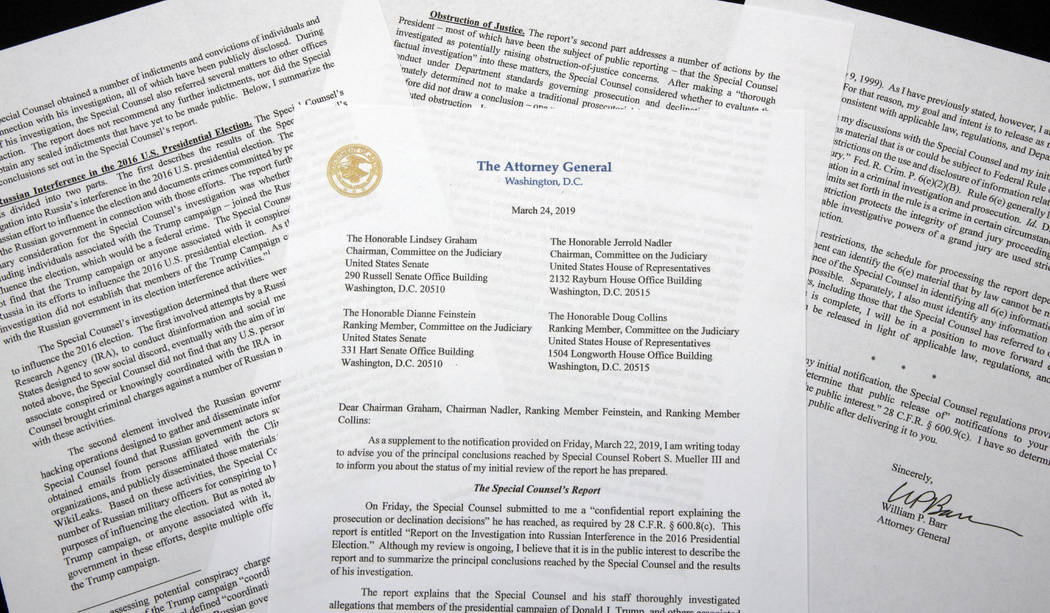Official: Mueller frustrated by Barr over portrayal of findings
WASHINGTON — Special counsel Robert Mueller expressed frustration to Attorney General William Barr last month about how the findings of his Russia investigation were being portrayed, saying he worried that a letter summarizing the main conclusions of the probe lacked the necessary context and was creating public confusion about his team’s work, a Justice Department official said Tuesday night.
Mueller communicated his agitation in a letter to the Justice Department just days after Barr issued a four-page document that summarized the special counsel’s conclusions about whether President Donald Trump’s campaign had conspired with Russia and whether the president had tried to illegally obstruct the probe, the official said. Mueller and Barr had a phone call the following day where the same concerns were addressed.
The letter lays bare a simmering rift between the Justice Department and the special counsel about whether Barr’s summary adequately conveyed the gravity of Mueller’s findings, particularly on the key question of obstruction. The revelation is likely to sharpen attacks by Democrats who accuse Barr of unduly protecting the president and of spinning Mueller’s conclusions in Trump’s favor.
And it will almost certainly be an expected focus of Wednesday’s Senate Judiciary Committee hearing at which the attorney general will defend his handling of Mueller’s report.
“After the Attorney General received Special Counsel Mueller’s letter, he called him to discuss it,” Justice Department spokeswoman Kerri Kupec said in a statement.
“In a cordial and professional conversation, the Special Counsel emphasized that nothing in the Attorney General’s March 24 letter was inaccurate or misleading. But, he expressed frustration over the lack of context and the resulting media coverage regarding the Special Counsel’s obstruction analysis,” she added.
In a March 24 letter, released two days after the Justice Department received the report, Barr said Mueller did not establish a criminal conspiracy between the Trump campaign and Russia to influence the 2016 presidential election. The letter also noted how Mueller had not reached a conclusion on whether the president had obstructed justice despite presenting evidence on both sides of the question.
Justice Department officials were confused because Mueller had not made a determination, prompting Barr and Deputy Attorney General Rod Rosenstein to step in and decide the evidence was insufficient to support an obstruction charge.
The letter did not detail the obstruction evidence Mueller’s team accumulated and did not describe Mueller’s legal analysis as he examined nearly a dozen episodes of potential obstruction. The report makes clear that Mueller’s thought process was shaped in part by a Justice Department legal opinion that says a sitting president cannot be indicted.
Barr has sought to downplay any disagreements with the special counsel, and has brushed aside allegations that he mischaracterized Mueller’s findings.
Barr said Mueller answered “no” when he asked him whether he would have recommended indicting Trump but for the Justice Department’s legal opinion. And at a congressional hearing last week that occurred after his phone call with Mueller, Barr said, “I don’t know whether Bob Mueller supported my conclusion.”
Barr and Mueller did discuss on the call whether additional context from the report could be released. But Justice Department officials have said they decided it made more sense to release the bottom-line findings of Mueller’s report rather than include the detailed legal analysis behind them. They also decided against releasing summaries that Mueller’s team had prepared.
The letter is likely to be a central focus at Wednesday’s Senate Judiciary Committee hearing with Barr. The appearance is Barr’s first since he released a redacted version of Mueller’s report on April 18 and comes amid deepening Democratic skepticism about his impartiality.
Those concerns have been fueled in part by Barr’s statements at a press conference announcing the release of the Mueller report, where he repeated multiple times that Mueller’s investigation had not found collusion between the Trump campaign and Russia — even though the report notes that collusion is not a legal term.
The Washington Post was first to report the contents of the letter. The newspaper said Mueller complained that Barr’s summary “did not fully capture the context, nature and substance of this office’s work and conclusions.”
“There is now public confusion about critical aspects of the results of our investigation,” according to Mueller’s letter. “This threatens to undermine a central purpose for which the Department appointed the Special Counsel: to assure full public confidence in the outcome of the investigations.”
Rep. Jerrold Nadler, the chairman of the House Judiciary Committee, which has been negotiating with Barr over a Thursday appearance, demanded that the Justice Department produce the letter by Wednesday morning.
“The Attorney General has expressed some reluctance to appear before the House Judiciary Committee this Thursday,” Nadler, D-N.Y., said in a statement. “These reports make it that much more important for him to appear and answer our questions.”
Sen. Mark Warner, D-Va., said: “This is exactly why I said Mr. Barr should never have been confirmed in the first place. At this point he has lost all credibility, and the only way to clear this up is for Mr. Mueller to testify publicly.”


















